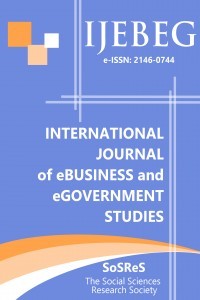FROM E-GOVERNANCE THROUGH M-GOVERNANCE: TURKEY APPLICATIONS
FROM E-GOVERNANCE THROUGH M-GOVERNANCE: TURKEY APPLICATIONS
M-Governance, Democracy Local Government, E-Understanding,
___
- Akarcalı, Bülent (2010), Bilgi Toplumu Nedir?, http://www.ekodiyalog.com/Makaleller/bilgi-toplumu-nedir? [Accessed 04.2012]
- Balcı, Asım (2003), E-Devlet: Kamu Yönetiminde Yeni Perspektifler, Fırsatlar ve Zorluklar”, Kamu Yönetiminde Çağdaş yaklaşımlar, Ankara: Seçkin Yaklaşımlar.
- Borucki, Chet, Arat, Seda, Kushchu, Ibrahim (2005), “Mobile Government and Organizational Effectiveness”, The First European Conference on Mobile Government, Sussex, pp. 56-66.
- Duverger, Maurice (2004), Çev: Şirin Tekeli, Siyaset Sosyolojisi, Yedinci Basım,
- İstanbul: Varlık Yayınları. Fındıkçı, İlhami (1988), “Enformasyon Bilgi Toplumu Dünyası; Bilgi
- Toplumunda Eğitim ve Öğretmen”, Bilgi ve Toplum Dergisi, April. Gang, Song (2005), “Transcenging e-Government: a Case of Mobile Government in Beijing”, The First European Conference on Mobile Government, Sussex, pp.476-485.
- Hampsher-Monk, Lain (2004), Çev:Necla Arat, Modern Siyasal düşünce Tarihi,
- Hobbes’tan Marx’a Büyük Siyasal Düşünürler, Birinci Baskı, İstanbul: Say Yayınları. http://sosyalmedya.com/m-devlet [Accessed 01.04.2012] http://www. dijitaldevlet.tc/category/makale [Accessed 24.12.2011]
- Kapani, Münci (2003), Politika Bilimine Giriş, On Beşinci Baskı, İstanbul: Bilgi Yayınları.
- Nohutçu Ahmetand Demokaan Demirel (2005), “Türkiye’deki E-Devlet
- Uygulamaları”, Türk İdare Dergisi, Vol:77, No:778. Nonaka, I. (2004), The Knowledge – Creating Company. Hitotsubashi on
- Knowledge Management. Singapore:John Wiley&Sons Pub. Öğüt, Adem (2003), Bilgi Çağında Yönetim, İkinci Baskı, Ankara: Pegem Yayıncılık.
- Özek, Çetin (1997), Devlet ve Din, Birinci Baskı, İstanbul: Ada Yayınları.
- Redhead, Brian (2001), Editör:Hikmet Özdemir, Siyasal Düşüncenin Temelleri,
- Birinci Baskı, İstanbul: Alfa Yayıncılık, Richards, Mike, Adam, Karim and Price, Blaine, A. (2005), “It’s Okay To Be A
- Dog On The Internet – Privacy And Trust In E-Government”, The First European Conference on Mobile Government, Sussex, pp.342-348. Roggenkamp, Klas (2007), “It’s the Mobility: Stupid”: Designing Mobile
- Government”, (in: İbrahim Kushchu, Mobile Government An Emerging Direction in e-Government), New York: IGI Publishing, pp.60-85. Schmidt, Manfred G. (2002), Çev: M. Emin Köktaş, Demokrasi Kuramlarına
- Giriş, İkinci Baskı, Ankara: Vadi Yayınları. Sevgi, Murat (2009), M-Devlet, http://blog.milliyet.com.tr/m- devlet/Blog/?BlogNo=17 [Accessed 30.03.2012]
- Stanoevska-Slabeva, Katarina, Hongisto, Patrizia (2005), “The Turku Approach to
- Create a Wireless Infrastructure”, The First European Conference on Mobile Government, Sussex, pp. 1-14. Sundar, Diatha Krishna and Garg, Shashank (2005), “M-Governance: A
- Framework for Indian Urban Local Bodies”, The First European Conference on Mobile Government, Sussex, pp. 395-402. Şahin, Ali (2008), Türk Kamu Yönetiminde Yapısal Dönüşüm ve E-Devlet,
- Konya: Çizgi Kitabevi Tozsa, Istvan and Budai, Balazs (2005), “M-Government in Hungary”, The First
- European Conference on Mobile Government, Sussex, pp. 414-425. Uçkan, Özgür (2003), E-Demokrasi ve Türkiye, Kamu Yönetiminin Yeniden
- Yapılanması İçin Strateji ve Politikalar-I, İstanbul: Literatür Yayıncılık. Yildiz, Mete (2007), “The State of Mobile Government in Turkey: Overview,
- Policy Issues and Future Prospects”, (in: İbrahim Kushchu, Mobile Government An Emerging Direction in e-Government), New York: IGI Publishing, pp.252
- Başlangıç: 2009
- Yayıncı: Sosyal Bilimler Araştırmaları Derneği
REFLECTION AND REFRACTION FOR KNOWLEDGE MANAGEMENT SYSTEMS
Tunc D. Medeni, I. Tolga Medeni
GOVERNMENTAL MOBILE TECHNOLOGY USAGES DURING PROMOTION EFFORTS OF REACHING THEIR CITIZENS
Fazli Yildirim, Ugur Cevdet Panayirci
FROM E-GOVERNANCE THROUGH M-GOVERNANCE: TURKEY APPLICATIONS
Rabia Bahar USTE, Berrin GUZEL
A COMPARATIVE STRATEGIC ANALYSIS OF SPACE TECHNOLOGIES: DEVELOPING A ROADMAP FOR TURKEY
ASSESSING E-GOVERNMENT SERVICE DELIVERY (GOVERNMENT TO CITIZEN)
Syed Faizan Hussain Zaidi, Mazen K. Qteishat
Hifzi Oguz Korkmaz, Tunc Medeni
EXPLORING THE RESEARCH ASSISTANTS’ OPINIONS TO IMPROVE SCIENCE PERCEPTION AT GRADUATE PROGRAMS
